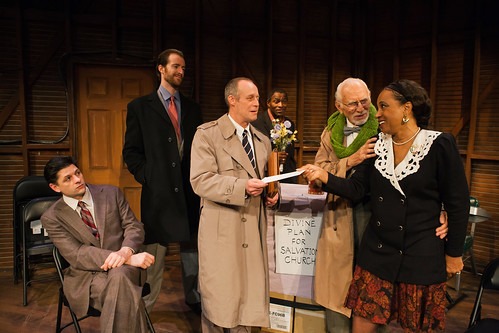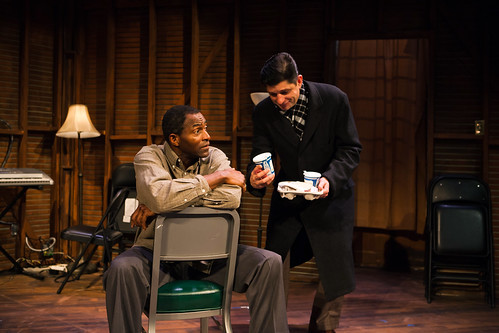
The Divine Plan for Salvation Church holds its first service in San Francisco Playhouse’s Storefront Church by John Patrick Shanley. The cast includes (from left) Gabriel Marin, Derek Fischer, Rod Gnapp, Carl Lumbly, Ray Reinhardt and Gloria Weinstock. BELOW: Lumbly and Marin address politics and spirituality and the battle between noise and stillness. Photos by Jessica Palopoli
In many ways, John Patrick Shanley’s Storefront Church, now at San Francisco Playhouse for a well-timed holiday run, is less about the battle between the material world and the spiritual world and more about finding the most personal of solutions to the stress and pull and darkness of life: being still.
In such a hectic world, stillness seems practically revolutionary, but that’s where the Rev. Chester Kimmich (Carl Lumbly) finds himself: in stillness waiting for an answer or a way to cross the giant black hole that has opened up before him.
The interesting thing in Shanley’s script, and in director Joy Carlin’s marvelously entertaining but deeply felt production, is that being still in the modern world comes with consequences. You can’t pull away from the world for any length of time without the world coming to look for you. In the Reverend’s case, his withdrawal into the realm of contemplation has real-world consequences. The $30,000 he borrowed from his landlady, a woman of great faith, was supposed to refurbish a storefront church. But months later, with the money spent, the church is still not open, and the landlady is facing foreclosure from the bank.
Is Chester being irresponsible by taking the money and not paying his rent? Or is his devotion so true that stillness and contemplation truly is the only way he can find a solution to his spiritual crisis?
The real world comes calling for Chester in the form of Donaldo (Gabriel Marin) the Bronx borough president who has a personal investment in the Reverend’s fiscal irresponsibility. It turns out that the clash between the ambitious politician and the spiritual seeker is just what each man needed to see himself and his place in the world a little differently.
Sort of a 21st-century It’s a Wonderful Life, weighing the value of the human soul against the human construct of commerce (aka greed), Storefront Church has the nobility of the big questions and the practicality of everyday life. On a fantastic turntable set (by Bill English), we spin through a gritty world of people struggling. Jessie (Gloria Weinstock) and her older husband Ethan (Ray Reinhardt) have financial woes and health concerns to deal with. Their different faiths – she’s a devout Christian, he’s a secular Jew – don’t cause conflict between them. If anything, they seem completely comfortable with their spiritual lives. It’s the money that’s putting on the pressure.
There’s no way that bank employees cannot be the bad guys in this scenario, but loan officer Reed (Rod Gnapp) is pretty sympathetic. Bank president Tom (Derek Fischer), on the other hand, is not. It doesn’t help that Shanley stacks the deck against him by 1) having him actually devour a gingerbread house during a meeting and 2) have him rather implausibly show up to a service at the Rev. Chester’s humble, unfinished church.
Somehow, though, it all works. No one is a monster here, and when the spirit begins to move people, the warmth and emotion comes as much from a simple gathering of people and their connection as it does from the religion itself.
In a way, that’s what theater itself does – gathers strangers, attempts to make them feel something, both individually and collectively, and leave a little bit different. In a broad sense, every theater is a storefront church, and right now the San Francisco Playhouse is shining with a little extra light.
FOR MORE INFORMATION
John Patrick Shanley’s Storefront Church continues through Jan. 11 at San Francisco Playhouse, 450 Post St., San Francisco. Tickets are $30-$100. Call 415-677-9596 or visit www.sfplayhouse.org.





